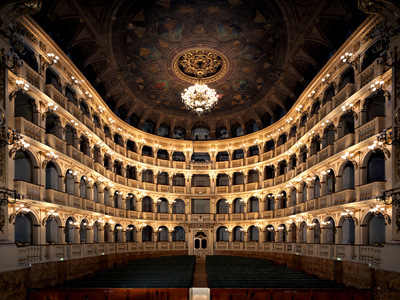
By ANDREW POWELL
Published: January 23, 2014
BOLOGNA — This accepting and slightly chaotic city, famous for mortadella, lies south of Munich on the road to Rome. Here Mozart studied, Rossini grew up, Verdi premiered Don Carlo for his compatriots and a Wagner opera, Lohengrin, was staged in Italy for the first time.
Here too Parsifal had its first legitimate performance outside Bayreuth — at 3 p.m. on Jan. 1, 1914 — without bending the rules, adjusting the clock or relying on unilateral court permission. Determined to honor the centenary of this particular feat, Teatro Comunale di Bologna braved national cutbacks in subsidy to schedule six performances of the Bühnen-Weih-Festspiel this month in its 1,034-seat, 250-year-old house (pictured). It contracted a thoughtful 2011 Romeo Castellucci staging from Brussels, assembled a mostly worthy cast and, as early as November reportedly, put its musicians into rehearsals under Roberto Abbado.
On the second night of the run (Jan. 16), a Wagnerian body of sound emerged promptly from the pit, dispelling qualms that the orchestra — known for its central role at the Rossini Opera Festival in Pesaro — might not rise to the occasion. (Actually the Orchestra del Teatro Comunale offers a hefty concert season, held at Bologna’s Teatro Auditorium Manzoni, which is, like Heinz Hall, a converted movie house, but smaller and with good acoustics. Musical America blogger James Conlon leads a Jan. 30 program showcasing Shostakovich’s arduous Babi Yar Symphony.) Though there were blemishes, notably in the Act I Transformation, this Parsifal provided a plush four hours orchestrally. The winds intoned with precision, the strings shone or shimmered as required, exchanges were attentive and collegial. Abbado swept the music along in voluptuous waves, binding phrases together and tirelessly gesturing. It was a far cry from presentation of this score as slabs of aural concrete, or worse, operatic Bruckner.
Someone deserves credit for casting young Gábor Bretz in the senior duties of Gurnemanz. Here is a voice to sit back and enjoy all by itself: opulent, secure, relaxed, smoothly produced from bottom to top — and Bretz sang with enough poise to carry Act I mirth-free while costumed like Papageno. It was tempting to wonder what he might bring to, say, Winterreise. Anna Larsson remains an artist associated with concert repertory, but her Kundry worked strikingly in this production. From the low center of her voice — more alto than mezzo — she built smooth lines upward, projecting powerfully at the top while lending her courier and temptress an apt aura of timelessness. Castellucci does not throw his characters around the stage, and wild Kundry is no exception, but he does endow her with a six-foot living snake, to be held in one hand as she appeals to Parsifal. The snake duly writhed. Larsson modeled composure.
Overparted in the title role, tenor Andrew Richards sang guardedly much of the time and could not always be heard. But there were no ugly notes, even at moments when he was forced to force. His impact, in any case, was impaired by a staging that presents Parsifal as neither fool nor hero. Detlef Roth and Lucio Gallo both suffered a beat in the voice, as Amfortas and Klingsor, roles they performed together six years ago in Rome. Relatively young, Roth brought honeyed tone and crystalline German, but Wehvolles Erbe, dem ich verfallen shook in all the wrong ways. Gallo came across best during loud passages. The production substitutes balletic mimes for the six singing Blumenmädchen, who toil in the wings and thus avoid the bondage and torment enacted in view. A rapt, intensely lyrical (and tidy) Komm! Komm! Holder Knabe epitomized Abbado’s view of the score. Other roles were variably taken. The adult and children’s choruses contributed energetically but were out of sight some of the time and rather muffled.
Trained at Bologna’s Academy of Fine Arts, Castellucci built a reputation in legitimate theater before turning, with this Parsifal, to the bigger-budget world of opera. Unlike many régisseurs from the spoken side, he can follow at least the spirit of a musical score, even to the point of letting a character simply stand and sing. His Théâtre Royal de la Monnaie commission drew acclaim when it was new (and filmed). Taking as cue the forested first scene in the Land of the Grail and exploiting this opera’s abstractness, it converts the action into a plea against deforestation and pollution — a noble move, except that the open-ended threat to our environment precludes catharsis in the opera. Parsifal’s enlightenment, then, results merely in his joining the cause; the Grail serves as metaphor (its light is a white curtain); Good Friday could be any day of the year; and, needless to report, there is no white dove. The interpretation climaxes in Act III as the activist crowd plods forward on a huge whirring treadmill during the sublime Karfreitags-Zauber interlude.
All that said, Castellucci’s fresh approach exudes a certain calm resolve and compels attention, aided by impressive lighting effects. This performance added the benefit of fine musicianship. In a month that has cost Bologna its eminent citizen Claudio Abbado and, dismayingly, its 10-year-old award-winning Orchestra Mozart, the achievement with the Wagner is soothing balsam.
Photo © Teatro Comunale di Bologna
Related posts:
Voix and Cav
Safety First at Bayreuth
Bretz’s Dutchman, Alas Miked
Mariotti Cheers Up Bologna
Muti the Publisher